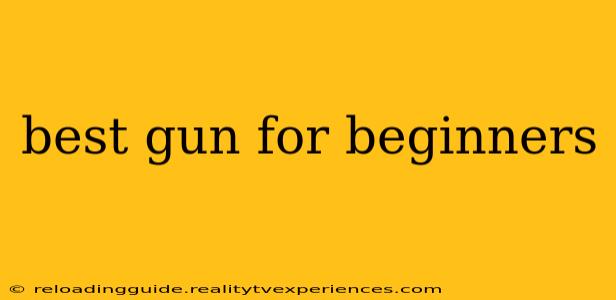Choosing your first firearm is a significant decision, demanding careful consideration and a responsible approach. This isn't just about picking a tool; it's about safety, personal defense, and potentially, a lifelong hobby. This guide aims to help you navigate the process, providing insights into selecting the best gun for beginners, emphasizing safety above all else. We'll explore various factors, including caliber, action type, and intended use.
Understanding Your Needs: Purpose and Environment
Before diving into specific firearms, consider why you need a gun. Self-defense at home? Target shooting at a range? Hunting? Each purpose dictates different firearm requirements.
-
Home Defense: Focus on reliability, stopping power, and ease of use in stressful situations. A shorter, easily maneuverable firearm is often preferred for home defense.
-
Target Shooting: Accuracy and comfort are paramount. Longer barrels provide better precision. The caliber is less critical as the focus is on skill development.
-
Hunting: The choice depends heavily on the game you intend to hunt. Larger calibers are generally needed for larger game.
Your environment also plays a crucial role. If you live in a densely populated area, a smaller caliber with less recoil might be a better choice than a powerful hunting rifle.
Caliber Considerations: Power and Recoil
Caliber refers to the diameter of the bullet. Larger calibers generally deliver more stopping power but also produce more recoil (the backward force of the gun firing). For beginners, a smaller caliber with manageable recoil is usually recommended to foster proper shooting technique and build confidence. Popular beginner-friendly calibers include:
-
.22 LR: Known for its low recoil, affordability, and availability of ammunition. Excellent for practice and plinking (casual target shooting).
-
9mm: A widely popular caliber for self-defense and target shooting. Offers a good balance between stopping power and manageable recoil for many.
-
.38 Special: A slightly larger caliber than 9mm, offering more stopping power but with increased recoil. Often used in revolvers.
It's crucial to remember that stopping power isn't solely determined by caliber. Shot placement is far more important than the size of the bullet.
Action Types: Revolvers vs. Semi-Automatic Pistols
The "action" refers to how the firearm operates. The two most common types for beginners are:
-
Revolvers: Simple, reliable, and generally easy to learn. They hold a limited number of rounds and require manual reloading after each cylinder is emptied.
-
Semi-automatic Pistols: Hold more rounds than revolvers and reload automatically after each shot. They can be slightly more complex to learn but are generally more efficient in self-defense situations.
Both offer viable options for beginners, with revolvers often preferred for their simplicity and reliability.
Choosing the Right Firearm: Recommendations for Beginners
Based on the factors discussed above, here are some general recommendations for beginners:
-
.22 LR Revolver: An excellent starting point for learning the fundamentals of firearm safety and handling. Low recoil allows for focused practice.
-
9mm Semi-automatic Pistol (with a smaller frame): A good option for self-defense training, offering a manageable balance between stopping power and recoil. Look for models designed for smaller hands if applicable.
Beyond the Firearm: Safety and Training
No matter which firearm you choose, safety is paramount. Always prioritize proper training before handling any firearm. Consider taking a reputable firearms safety course taught by certified instructors. This will teach you safe handling procedures, proper shooting techniques, and legal responsibilities related to firearm ownership.
Disclaimer: This article provides general information and should not be considered professional advice. Always consult with a qualified firearms expert and adhere to all applicable laws and regulations before purchasing or handling any firearm. The information provided here is for educational purposes only.

